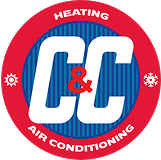Whether you live in a small condo or a five-bedroom home, everyone wants a warm place to enjoy during the winter. It’s also a fair expectation to feel the heat once you’ve turned it on. In an effort to preserve and circulate heat in a cost-efficient manner, you’ll want to implement a few tips into your household maintenance plan. In order to get started, consider the following tips for conserving heat in the winter.
1. Utilize South-Facing Windows and Sunlight
The sun is a powerful and free resource that you can use to heat your home. Even if you don’t have solar panels, you can still take advantage of the sun’s energy. On sunny days, open up the curtains and blinds on the south-facing windows to let the sunlight flood your home. This will help warm up those rooms. In the evening, open up the windows and blinds on the west-facing side of your home to catch the last rays of the sun. While the warmth from the sun won’t last forever, it can be a great way to supplement other heating sources like space heaters or fans. Overall, using the sun’s energy is an effective and inexpensive way to keep your home warm.
2. Install Insulation
When it comes to insulating your home, taking a multipronged approach is the key. First, focus on what you can do on your own. Then, consider the jobs that require professional assistance and a budget. Lastly, look at options that require small behavioral changes.
Beginner-Friendly Tasks
Ensuring that your windows are energy-efficient is a great start. Insulating window films and weatherstripping can be relatively low-cost solutions to reduce heat loss and drafts. You can also use draft stoppers or draft excluders for doors.
Professional Assistance
Professional insulation inspection is crucial, especially if you’re unsure about the condition of your insulation. Insulation does degrade over time, and having it inspected and replaced every 20-30 years can significantly improve your home’s energy efficiency.
Behavioral Changes
Using insulated curtains during colder months is a good practice as they help retain heat. Swapping them out in warmer months allows you to take advantage of natural light and ventilation. Monthly checks for cracks and seals are essential for identifying and addressing potential energy leaks. Using caulking to seal any gaps can help maintain indoor heat and prevent drafts.
3. Use Fans and Space Heaters
Adjusting your ceiling fans to rotate clockwise during the colder months is a great idea. This direction pushes warm air that naturally rises to the ceiling down into the room. This improves heat distribution and makes the space feel warmer.
Combining a space heater with a fan can be a cost-effective and safe approach. Running the fan first to distribute warm air and then using the space heater for a short time can help maintain a comfortable temperature in the room. Using a space heater that is appropriately sized for the room is crucial. An undersized heater may not provide enough warmth. An oversized space heater is potentially unsafe.
These strategies help you make the most of your heating resources while keeping energy costs in check. Using a ceiling fan and space heater together can help achieve even heating in the room without overworking the heater. Additionally, it’s essential to follow safety guidelines when using space heaters. Keep them away from flammable materials, use heaters with safety features, and turn them off when not in use or when you leave the room.
4. Avoid Heating Unused Spaces
One way to save energy is to pay attention to the areas of your home that get the least amount of foot traffic. For example, if you have an extra office space that’s not in use or a basement that no one ever spends time in, you can close the vents to those rooms instead of heating them. It’s also important to keep the doors to these low-traffic rooms closed to prevent the cold air in those rooms from mixing with the warm air in the rest of the house. This creates a barrier that helps maintain a more consistent temperature in the main living areas.
Additionally, if you have a more advanced heating system, you might have the option to create heating zones in your home. Established heating zones allow you to control the temperature in different areas independently. If you have such a system, it’s worth exploring how to set up zones to save energy.
5. Lower Temperatures on Thermostat and Water Heater
It may seem counterintuitive, but lowering the heat can actually help you save money on energy bills and conserve heat. Even decreasing the temperature by just one degree can make a difference in the long run. This applies not only to your thermostat but also to your water heater. While water heaters are typically set at 140°F to kill bacteria, a temperature of 120°F is still sufficient for warmth and sanitation. Even setting it 10 degrees higher at 130°F can conserve heat and energy. Stay on top of your thermostat and water heater maintenance by contacting a company like C & C Heating and Air Conditioning. We’ve excelled at providing services to the Metro Detroit area for six decades.
Additionally, maintaining a consistent temperature for your HVAC system can be more efficient than fluctuating the temperature throughout the day. To stay warm, instead of adjusting the thermostat, adjust yourself. Consider wearing layers when you’re lounging around. Wear cozy slippers to keep your feet warm. At night, use extra blankets instead of constantly adjusting the thermostat.
6. Check HVAC System and Air Filters
Once the heat gets turned on, the ultimate goal is to feel warm and comfortable in your home. However, if you find that the heat is on but you don’t feel it, it might be time to check your HVAC system. There could be a few possible reasons for this.
First, it might be time to change your air filters. Make a habit of changing your air filters at least once every three months. If you have pets or suffer from allergies, you may need to change them more frequently. When your air filters are not replaced regularly, they can become clogged with dust and debris, which can block the flow of air throughout your home. This can make your HVAC system work harder to force air through the filters, leading to poor circulation of heat and a higher energy bill. By changing your air filters regularly, you can help your HVAC system circulate air throughout your home with ease, which can help conserve energy and heat.
Including Professional Assistance
If you suspect that there may be a more significant issue with your HVAC system, it is recommended that you call in a professional for assistance. Catching problems early can help prevent them from becoming more extensive and costly to repair.
At C & C Heating and Air Conditioning, we can provide invaluable professional assistance with your HVAC system. Through a diagnostic consultation, you’ll gain access to our qualified technicians who can help with duct cleanings, smart thermostat installations, and more. Our extensive service offerings also include water heater installations, heat pump servicing, and furnace maintenance. For more information on how we can serve you, contact us today!






